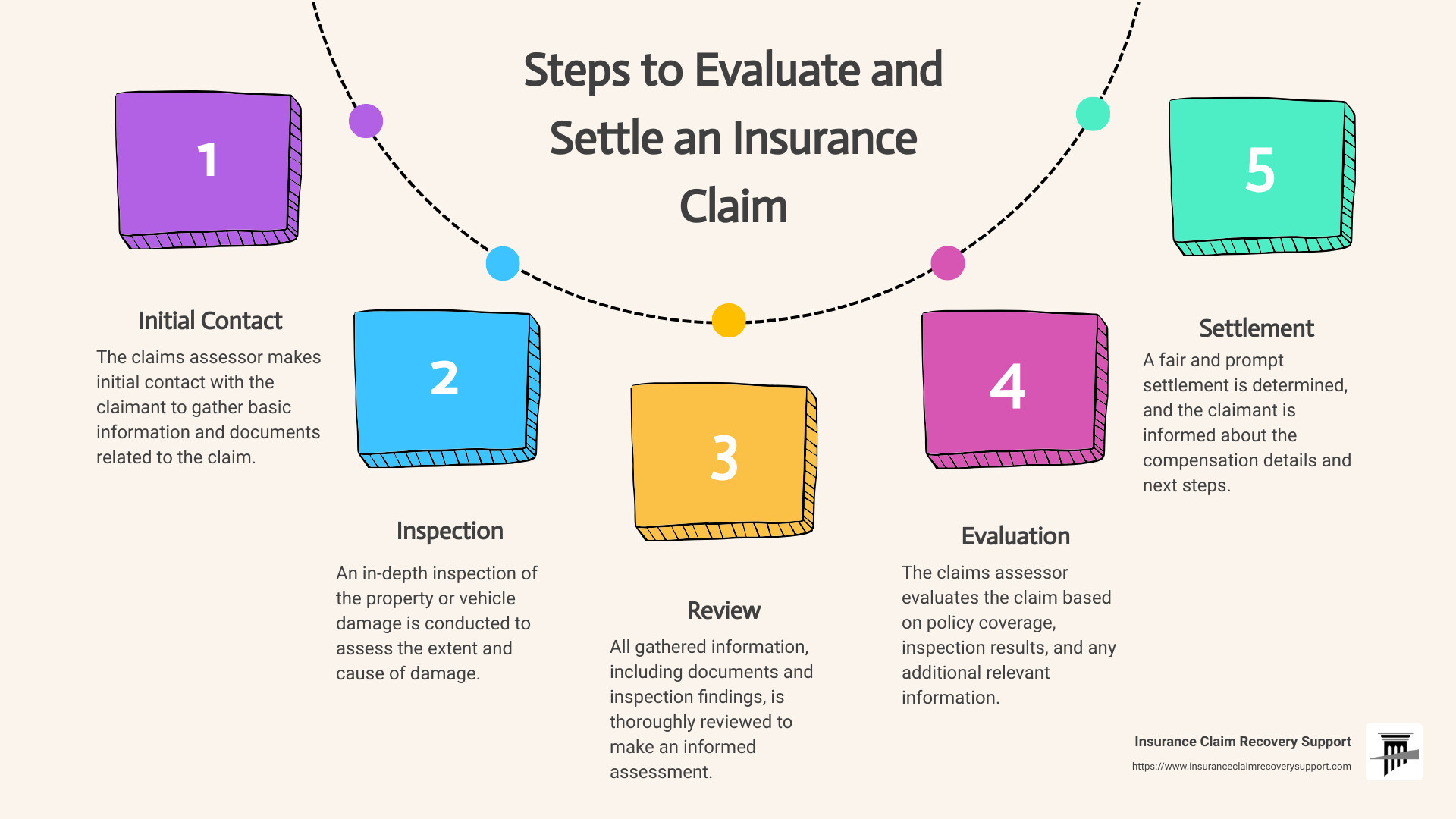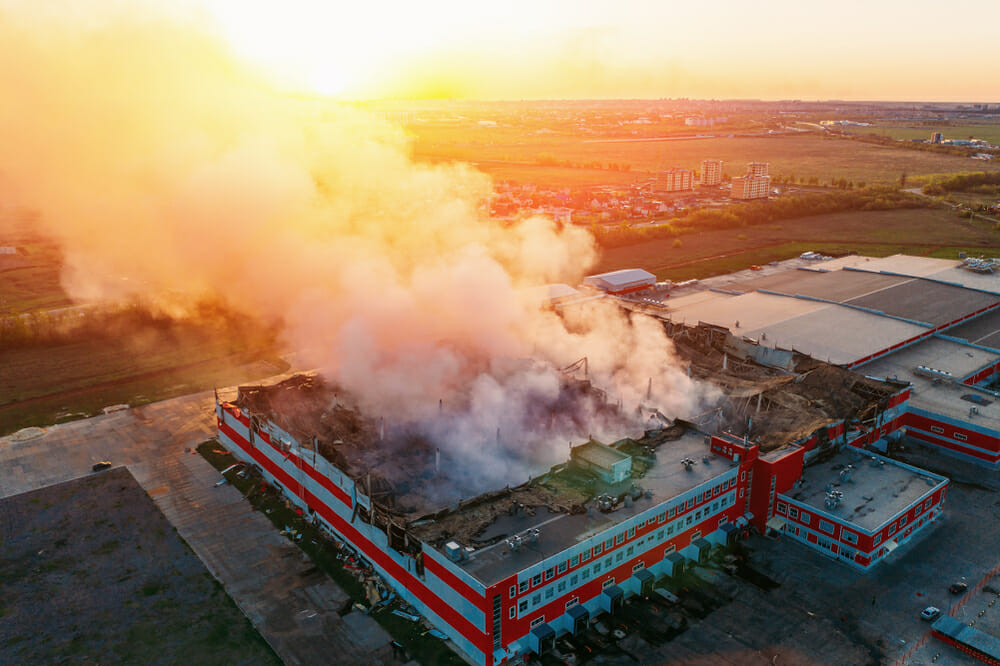Quick Snapshot: Claims Assessors
– Role: Evaluate and assess insurance claims
– Importance: Ensure fair and prompt settlements
– Specialties: Property, medical, automotive claims
– Skills: Excellent communication, analytical thinking
Are you feeling overwhelmed with the insurance claims process after your property was damaged? Navigating through insurance claims can be a maze, filled with technical jargon and complex procedures. You might be wondering, who can help you ensure that your claim is fairly evaluated and that you receive a prompt settlement. Enter the Claims Assessor.
Claims Assessors play a pivotal role in the insurance industry. Their primary job is to inspect, evaluate, and assess situations or property damage to make informed decisions on insurance claims. Whether it’s damage from a fire, hail, hurricane, tornado, or flood, a proficient Claims Assessor is your ally in navigating the complexities of the claim process. They specialize in various areas such as property, medical, or automotive claims and are equipped with skills like empathetic customer service, conducting thorough investigations, and boasting an analytical mindset to process complex information.
Understanding the Value of Claims Assessors: A Visual Guide
By bringing clarity to the claims process and advocating for fair settlements, Claims Assessors ensure that property owners don’t have to face the daunting task of negotiating with insurance companies alone. This introduction will dive into the roles, importance, and how Claims Assessors are vital in ensuring property damage victims not only navigate the insurance maze but come out victorious.
Understanding the Role of a Claims Assessor
Insurance claims are a critical part of recovering from an unexpected event, such as fire, hail, or flood damage. The role of a claims assessor, also known as an insurance claim assessor, is central in evaluating these claims to ensure that policyholders receive a fair and just settlement. Let’s delve into what this entails and the various professionals involved in the process.
Claims Adjusters, Appraisers, Examiners, and Investigators
Claims assessors can come in different forms: adjusters, appraisers, examiners, and investigators. Each plays a unique role in the insurance claim process, but their core function revolves around evaluating insurance claims. They work in various environments, from offices to the field, depending on the nature of the claim. Here’s a brief overview:
-
Claims Adjusters: They are often the first point of contact for a policyholder after a loss. Adjusters inspect property damage, assess the insurance claim, and determine the insurance company’s liability. They may interview the claimant and witnesses, gather police and hospital records, and inspect property damage to determine the extent of the company’s liability.
-
Appraisers: Specifically focus on evaluating the cost of repairing or replacing damaged property. For example, an auto appraiser would assess the damage to a car and estimate repair costs.
-
Examiners: These professionals usually work behind the scenes, reviewing claims submitted by adjusters to ensure that the settlement recommendation follows company policies and customer coverage.
-
Investigators: Sometimes, when a claim is unusually large or complicated, investigators are called in. They delve deeper into claims where fraud is suspected, conducting extensive research and interviews to verify details.
The work environment for these roles can vary significantly. While some claims assessors spend most of their time in an office setting, others, like field adjusters, spend much of their time on-site at the property assessing damage firsthand. This hands-on approach is essential in accurately determining the extent of the damage and the fair value of the claim.
At Insurance Claim Recovery Support, we understand the nuances of these roles and the complexities involved in the insurance claim process. Our team of experienced professionals works diligently to ensure that your claim is thoroughly evaluated and that you receive the compensation you’re entitled to. We advocate on your behalf, navigating the intricate details of the claims process, so you don’t have to.
In summary, claims assessors play a pivotal role in the insurance industry, ensuring that claims are evaluated fairly and efficiently. This process involves a thorough examination of the damage, assessment of the claim, and determination of the settlement amount. Whether you’re dealing with property damage from a natural disaster or assessing auto damage after an accident, claims assessors are key to achieving fair settlements and helping policyholders recover from unexpected events.
How to Become a Claims Assessor
Entering the field of claims assessment can be a rewarding career path, offering the opportunity to help individuals navigate through some of their most challenging times. Here’s how you can embark on this journey.
Entry-level Education
To kickstart your career as a claims assessor, the minimum educational requirement is typically a high school diploma or GED. This foundational education equips you with basic skills in communication, problem-solving, and mathematics, all of which are crucial in the role of a claims assessor.
Work Experience
While you can start in this field without specific work experience in insurance, having a background in areas related to insurance, finance, customer service, or even construction can be beneficial. It provides a practical understanding of the various elements you will deal with as a claims assessor.
On-the-job Training
Once you secure an entry-level position, you will undergo on-the-job training. This training is essential as it introduces you to the specific procedures, software, and evaluation techniques you’ll use on a daily basis. It’s during this period that you’ll learn the ins and outs of assessing claims, from inspecting damages to estimating repair costs.
Qualifications and Skills Required
-
High School Diploma: As mentioned, this is the minimum requirement to get started.
-
Bachelor’s Degree: While not mandatory, having a degree in finance, insurance, business administration, or a related field can give you an edge. It provides deeper knowledge that can be applied in assessing complex claims.
-
Insurance-related Work Experience: Experience in the insurance industry, even if not directly in claims assessment, can be incredibly valuable. It helps you understand the broader context of your work, including the importance of policy details and customer service.
-
Certifications: Consider obtaining certifications specific to claims assessment or insurance adjusting. These certifications, while not always required, demonstrate your commitment to the profession and can enhance your career prospects.
-
Skills: Beyond formal education and certifications, certain soft skills are essential for success in this role. You’ll need excellent communication skills to interact with claimants, insurance company representatives, and other stakeholders. Analytical skills are crucial for evaluating claims and making fair assessments. Being organized and having attention to detail will ensure that all aspects of a claim are thoroughly reviewed and processed efficiently.
In conclusion, becoming a claims assessor involves a mix of education, work experience, and on-the-job training. While the path to this career can vary, possessing the right qualifications and skills will prepare you for the challenges and rewards of helping people navigate through the complexities of insurance claims. As part of our team at Insurance Claim Recovery Support, we value the role of claims assessors in advocating for policyholders and ensuring they receive the fair settlement they deserve.
The Claims Assessment Process in Detail
Insurance Claim Recovery Support takes pride in our comprehensive and meticulous approach to claims assessment. This process is the backbone of what we do, ensuring every client receives the utmost care and expertise when handling their insurance claims.
Inspecting Properties
Our claims assessors start by conducting thorough inspections of the damaged properties. This is a critical step where we document the extent of the damage with precision. We use state-of-the-art tools and methodologies to ensure nothing is overlooked. Whether it’s a residential home or a commercial building, our team is trained to identify and record every detail of the damage.
Estimating Cost
Following the inspection, we embark on the complex process of estimating the cost of repairs. This involves a detailed analysis of the damage, sourcing the current prices for materials and labor, and applying our deep understanding of construction and repair processes. Our aim is to develop an accurate, fair estimate that reflects the true cost of returning the property to its pre-damage condition.
Auto Damage
In cases of auto damage, our assessors are adept at evaluating the extent of vehicle damage. This includes not only the visible damage but also any potential internal damage that could compromise the safety and functionality of the vehicle. Our assessments are thorough and aimed at ensuring clients receive a fair compensation to cover all necessary repairs.
Types of Claims
Insurance Claim Recovery Support has experience in handling a wide variety of claims types, including:
-
Property Damage: Our team is well-versed in assessing damage to both residential and commercial properties resulting from a variety of causes.
-
Fire: Fire damage claims are particularly complex due to the combination of structural damage, water damage from firefighting efforts, and smoke damage. Our assessors are skilled in evaluating all aspects of fire damage.
-
Hail: We are experts in identifying and assessing hail damage, which can often be subtle and overlooked by untrained eyes. From roof damage to siding and window damage, we ensure every impact is accounted for.
-
Hurricane: The catastrophic nature of hurricanes means our assessments must be comprehensive, accounting for wind, water, and debris damage.
-
Tornado: Tornado damage can be extensive and erratic. Our team is trained to navigate these challenging scenarios, ensuring a thorough evaluation is conducted.
-
Flood: Flood damage assessments require a keen understanding of water damage, including potential mold and structural issues that may not be immediately apparent.
At Insurance Claim Recovery Support, we understand that navigating the claims process can be daunting for property owners. Our role as claims assessors is to alleviate that burden, providing expert evaluations and advocating for the fair treatment of our clients. Through detailed inspections, precise cost estimations, and a deep understanding of various types of damage, we ensure that each claim is handled with the professionalism and dedication it deserves.
Salary and Job Outlook for Claims Assessors
When considering a career as a claims assessor, understanding the financial and job security aspects is crucial. Let’s break down the key points regarding salary expectations and the employment landscape for those in the field.
Median Annual Wage
Claims assessors, also known as claims adjusters, appraisers, examiners, and investigators, have a wide range of earning potential. In certain states like Texas, a property field adjuster can expect an average salary of $64,240 per year. However, the top earners in this niche may see annual salaries reaching up to $90,244. These figures illustrate the potential for a lucrative career in claims assessing, particularly for those who are independent and handle a variety of claims for different companies.
Employment Projection
The job outlook for claims assessors is influenced by a myriad of factors, including the frequency of natural disasters and the evolving landscape of the insurance industry. While the demand for skilled assessors rises in the wake of events like hurricanes, hailstorms, and floods, technological advancements and changes in policy processing may impact the overall need for human assessors.
Openings
Open positions in the field are often dictated by two primary factors: the creation of new jobs and the replacement of workers who retire or leave the profession. Given the specialized nature of claims assessing, positions may become available as experienced professionals retire, offering opportunities for newcomers to enter the field.
Employment Trends
The employment trend for claims assessors has seen fluctuations, with potential for both growth and decline. The increasing number of natural disasters has elevated the demand for skilled professionals who can accurately assess property damage and expedite the claims process. However, advancements in technology and automation could lead to a more competitive job market, as insurance companies seek to streamline operations and reduce costs.
Despite these challenges, the need for replacement assessors due to retirement remains a constant, suggesting that opportunities will continue to be available for those entering the field.
In navigating these trends, aspiring claims assessors should focus on building a robust skill set, including technical knowledge of property assessment, familiarity with insurance regulations, and the ability to navigate complex claims. Networking and continuous learning are also key strategies for success in this dynamic field.
At Insurance Claim Recovery Support, we recognize the evolving landscape of the claims assessor profession. We are committed to supporting our team through continuous training and development, ensuring they are well-equipped to meet the challenges and opportunities that lie ahead in the insurance industry. Our role as claims assessors is not just about assessing damage—it’s about advocating for fairness and helping our clients navigate through their most challenging times.
Navigating the Insurance Claim Process in Texas
In Texas, the journey through the insurance claim process can seem like navigating a complex maze. From the Hill Country to the Gulf Coast, each area has its unique challenges, especially when you’re dealing with the aftermath of fire, hail, hurricanes, tornadoes, or floods.
Key Texas Cities for Claims Assessing
Whether you’re in Austin, with its booming development and occasional flash floods, or Dallas, which sees its fair share of hailstorms, understanding how to effectively manage your insurance claim is crucial. In Fort Worth and San Antonio, rapid urban expansion and frequent storms can lead to a variety of insurance claims, from property damage to auto claims.
Houston is no stranger to flooding and hurricane damage, making it a city where a seasoned claims assessor can make a significant difference in the recovery process. Similarly, in Lubbock and San Angelo, the risk of tornadoes and hail requires a keen understanding of both the environment and the intricacies of insurance policies.
Cities like Waco, Round Rock, Georgetown, and Lakeway also face their share of weather-related challenges, from severe storms to wildfires, emphasizing the need for property owners to be prepared and well-informed.
For those of us at Insurance Claim Recovery Support, navigating the insurance claim process in these key Texas cities is second nature. Here’s how we can help:
- Immediate Response: After a storm or fire, time is of the essence. We help you take the necessary steps to protect your property from further damage, a crucial step in the claim process.
- Documentation and Evidence: Proper documentation of damage is vital. We guide you on how to capture the necessary photos and maintain a log of all damages and correspondence with your insurance company.
- Expert Advocacy: Insurance companies are businesses, aiming to minimize payouts. We stand by your side, advocating for your best interests, ensuring you get the settlement you deserve.
- Local Insights: Understanding local weather patterns and common types of damage in Texas cities equips us to handle your claim with expertise. Whether it’s dealing with hail damage in Dallas or flood recovery in Houston, we’ve got you covered.
Navigating the insurance claim process in Texas doesn’t have to be a journey you take alone. With our expert team of public adjusters, you’re supported every step of the way — from assessing the damage to negotiating with your insurance company for a fair and prompt settlement.
For property owners across Texas, from urban centers like Dallas and Austin to the coastal regions and beyond, knowing you have a dedicated team ready to support you can make all the difference. Let us help you navigate the complexities of the insurance claim process, ensuring you’re fully compensated for your losses.
Frequently Asked Questions about Claims Assessors
Navigating insurance claims can be daunting. We often get questions about the role of claims assessors, how to interact with them, and what qualifications are necessary for the job. Let’s dive into some of these frequently asked questions to offer clarity and guidance.
What Does a Car Insurance Assessor Do?
A car insurance assessor, also known as an auto insurance adjuster, plays a crucial role in the aftermath of an automobile accident. Their job is to:
- Inspect the damage to the vehicle.
- Gather evidence and statements from involved parties.
- Determine the extent of the insurance company’s liability.
- Estimate the cost of repairs.
- Make recommendations for payment to the claimant.
They ensure that the claim process is fair, efficient, and in accordance with the policy terms.
How to Deal with Insurance Assessors?
Dealing with insurance assessors can be straightforward if you keep these tips in mind:
- Be Prepared: Have all relevant documents, such as your insurance policy, photographs of the damage, and any repair estimates, readily available.
- Be Honest: Provide accurate details about the incident and damage. Misrepresenting facts can complicate the process.
- Ask Questions: If you’re unsure about any part of the assessor’s evaluation or the claim process, don’t hesitate to ask for clarification.
- Stay Calm and Patient: Assessors have a job to do, and the process takes time. Keeping a positive and cooperative attitude can help expedite your claim.
Insurance Assessor Qualifications?
To become an insurance assessor or adjuster, specific qualifications can vary by region but generally include:
- Education: A high school diploma is typically required, though many employers prefer a bachelor’s degree, especially in fields related to insurance, business, or finance.
- Licensing: Many states require assessors to be licensed. This usually involves passing a state exam and completing continuing education courses.
- Experience: Entry-level positions may not require previous experience, but for more specialized roles, such as in auto damage, employers may seek candidates with relevant work experience.
At Insurance Claim Recovery Support, we ensure our team is not only highly qualified but also deeply committed to advocating for our clients. We understand the intricacies of insurance claims and strive to simplify the process for property owners facing damage from fire, hail, hurricanes, and more.
Whether you’re dealing with a car insurance claim or property damage, having a seasoned claims assessor on your side can significantly influence the outcome of your claim. Feel free to reach out to us for support or guidance on your claim process.
Conclusion
Claims Assessors, Critical role, Insurance industry
In wrapping up our exploration into claims assessors, it’s clear that their role is not just important but critical within the insurance industry. These professionals stand at the crossroads between policyholders and insurance companies, ensuring that claims are evaluated fairly and efficiently.
For property owners who have experienced damage due to fire, hail, hurricanes, tornadoes, or floods, the journey through the insurance claim process can be daunting. It’s a path littered with complex paperwork, technical jargon, and the stress of negotiating with insurance companies to secure a fair settlement. This is where the expertise and advocacy of a claims assessor become invaluable.
At Insurance Claim Recovery Support, we understand the frustration and helplessness that can come with navigating the aftermath of property damage. Our team of skilled claims assessors is committed to shouldering this burden for you. We delve into the intricate details of your insurance policy, assess the extent of your property damage with precision, and advocate on your behalf to ensure that your claim is not just heard but fully addressed.
The goal is not just about filing a claim; it’s about securing the settlement that you rightfully deserve. This is why choosing a claims assessor with a solid track record, a commitment to continuous learning, and strong analytical skills is crucial. Our team embodies these qualities, working tirelessly to level the playing field between you and your insurance company.
In conclusion, the role of claims assessors in the insurance industry cannot be overstated. They not only provide much-needed expertise and guidance through the claims process but also champion the rights of policyholders. For anyone facing damage from fire, hail, hurricanes, and more, having a seasoned claims assessor on your side can significantly influence the outcome of your claim. If you find yourself in such a situation, remember, we at Insurance Claim Recovery Support are here to help. Reach out to us for support or guidance on your claim process, and let us advocate for the fair and prompt settlement you deserve.







